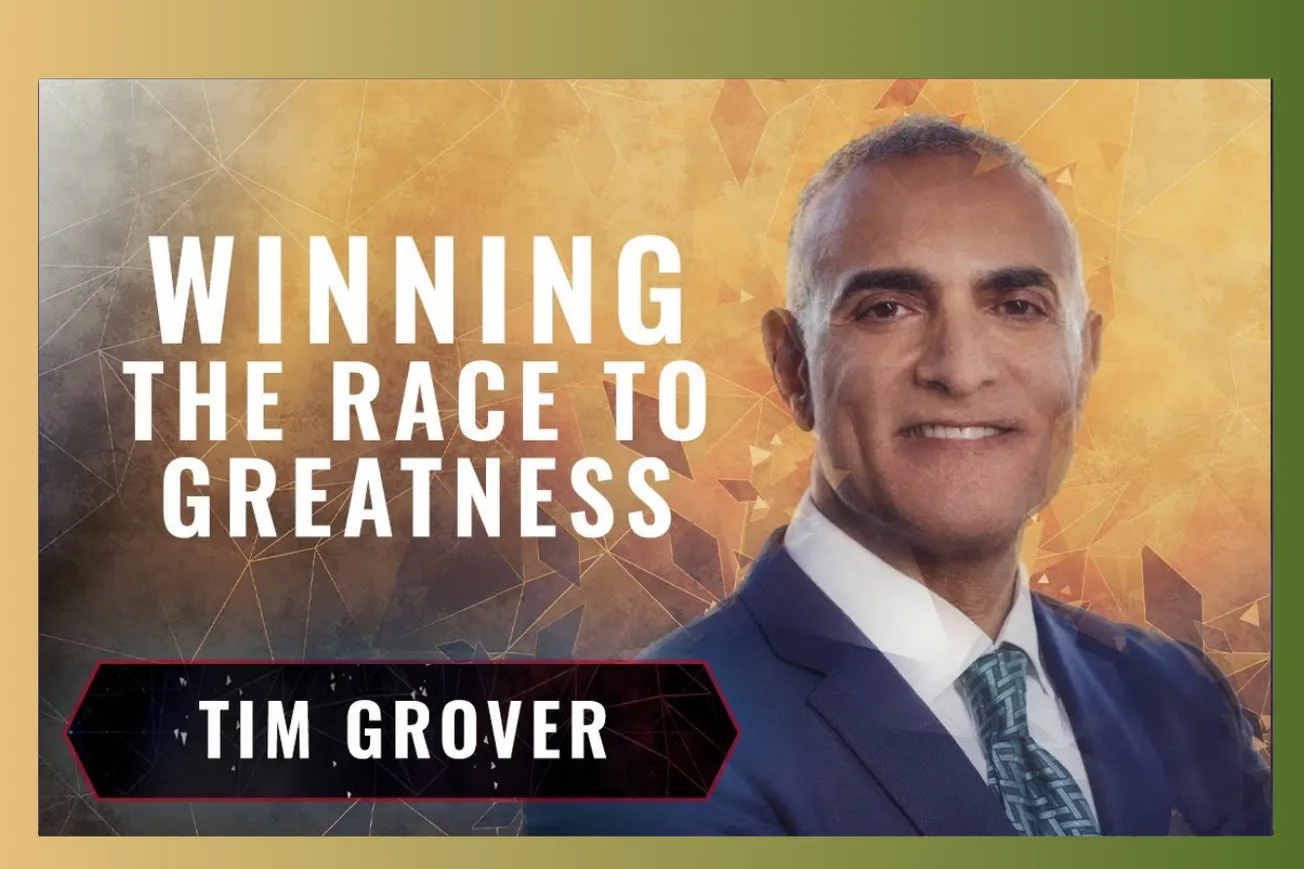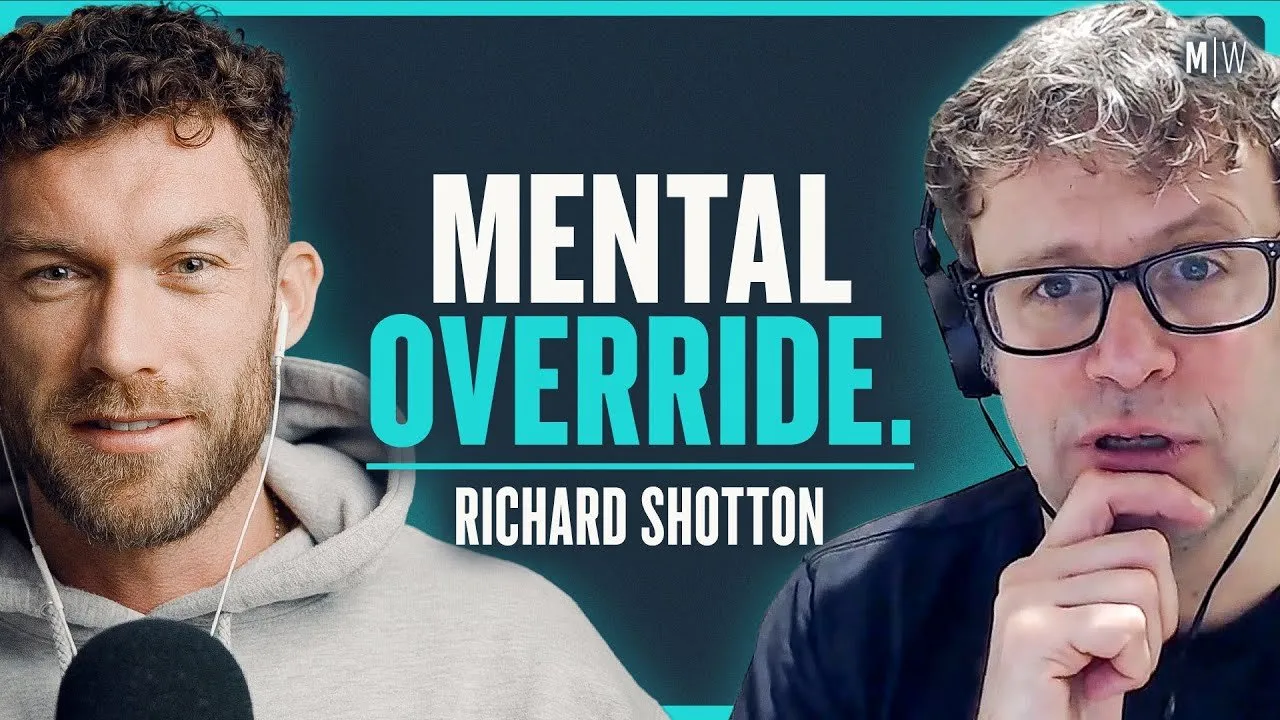Table of Contents
Tim Grover, legendary trainer to Michael Jordan and Kobe Bryant, exposes the harsh realities behind championship success that motivational coaches won't tell you. This raw conversation reveals why winning is "uncivilized, hard, nasty, unpolished, dirty, rough, unforgiving, unapologetic, uninhibited, and everything"—and why that's exactly what it takes to achieve greatness.
Key Takeaways
- Winning is not motivational—it's brutal, unforgiving, and requires complete sacrifice of comfort and conventional balance.
- Hard work alone doesn't guarantee success; you must go beyond requirements and do things others won't repeatedly for years.
- Entitlement kills winning because success belongs to someone else and must be taken through relentless competition.
- Michael Jordan worked smarter while Kobe Bryant worked harder, representing two different but equally effective paths to excellence.
- Elite performers are obsessed with microscopic details that others consider insignificant, like different shoelace patterns for each foot.
- There is no balance in championship performance—you create your own definition by subtracting non-essentials, not adding more.
- Confidence comes from betting on yourself repeatedly, even when you fail, because each failure teaches you to stand up stronger.
- Focus management trumps time management because focus blocks distractions while time creates them.
Timeline Overview
- 00:00–05:00 — Introduction and Book Motivation: Tim Grover explains why he wrote "Winning" to cut through motivational BS and reveal what actual victory requires
- 05:00–12:00 — Defining Winning: The ten words athletes use to describe winning, why half begin with "un-" prefix, and winning as an omnipotent force that doesn't apologize
- 12:00–18:00 — Entitlement and Requirements: How hard work is just baseline requirement, not deserving reward, and why showing up equals "none of the battle"
- 18:00–25:00 — Taking What Belongs to Others: Winning always belongs to someone else who must be defeated through competition, not formulaic steps
- 25:00–32:00 — Educational System Critique: Why schools teach "what to think" instead of "how to think," limiting innovation and championship-level problem solving
- 32:00–38:00 — Confidence as Ultimate Drug: Betting on yourself repeatedly, learning from failures, and standing up stronger, smarter, and more resilient each time
- 38:00–45:00 — Finding Joy in Hell: Laughing at yourself during brutal journey, finding small wins in losses, and embracing difficulty as pathway to transformation
- 45:00–52:00 — Tim Grover's Origin Story: From minimum wage health club trainer to working with Michael Jordan through handwritten letters and innovative approach
- 52:00–58:00 — Michael Jordan's Training Innovation: Four-quadrant body approach, working weaker side more, and revolutionary game-day training that experts said was impossible
- 58:00–65:00 — Team vs Individual Sports: Setting individual goals that benefit team victory, creating chaos to develop clarity, and mental tasks during physical fatigue
- 65:00–72:00 — Jordan vs Kobe Training Differences: Michael's visual learning and smart work versus Kobe's need for physical repetition and relentless grinding mentality
- 72:00–78:00 — Obsession with Details: Different ankle taping methods, unique shoelacing patterns, and why "sweating everything" rather than ignoring small stuff creates champions
- 78:00–85:00 — Balance is Personal Creation: Isaiah Thomas vs Karl Malone championship philosophy, subtracting non-essentials rather than adding more responsibilities
- 85:00–92:00 — Time vs Focus Management: Why managing focus blocks distractions while time management creates them, and Kobe's tragic reminder that "we don't have time"
Winning Demands Everything and Apologizes for Nothing
Tim Grover's definition of winning shatters every motivational cliché about success. Through decades of training the world's most dominant athletes, he discovered that champions describe winning using ten brutal words: uncivilized, hard, nasty, unpolished, dirty, rough, unforgiving, unapologetic, uninhibited, and everything. The fact that half begin with the prefix "un-" reveals winning's true nature—it can only be understood by what it isn't.
- Winning reaches out to shake your hand and has no idea who you are, demanding you prove your worthiness through actions rather than intentions or past achievements.
- The pursuit strips away politeness and civility, requiring you to get your hands dirty in ways that comfortable people find disturbing or unseemly.
- Victory belongs to someone else and must be taken through direct competition, making winning inherently about defeating others rather than personal improvement alone.
- Champions find joy in the brutal journey itself, learning to laugh at their failures while using each setback as fuel for the next attempt.
- The emotional release at the end comes from years of alienating people, sacrificing comfort, and maintaining focus when everyone else gives up or settles.
- Winning immediately changes the combination lock to future victories, making each success the starting point for an even more difficult challenge.
Hard Work is Just the Baseline Requirement
The most dangerous myth about success is that hard work guarantees results. Grover exposes this fallacy by distinguishing between meeting requirements and exceeding them consistently over years. Elite performers understand that being busy, working hard, and showing up are merely the entry fees to compete at the highest levels.
- Everyone works hard, everyone is busy, and everyone shows up—these are basic requirements that deserve no recognition or reward from winning itself.
- True champions go beyond requirements repeatedly for years, doing things others consider excessive, unnecessary, or obsessive in their attention to detail.
- Entitlement kills winning because it assumes past effort should guarantee future results, but each victory must be earned independently through fresh competition.
- Showing up equals "none of the battle" rather than the commonly quoted "half," because presence without excellence is meaningless at championship levels.
- Winners seek validation from within rather than from others, understanding that external approval often comes from people "clapping because they have to."
- The individuals who achieve sustained excellence consistently perform invisible work that nobody sees, notices, or cares about except themselves.
Michael Jordan's Intelligence Versus Kobe Bryant's Obsession
Grover's intimate work with both Michael Jordan and Kobe Bryant reveals two fundamentally different approaches to achieving identical results. Their contrasting methods demonstrate that there are multiple pathways to excellence, but all require complete commitment to their chosen approach.
- Jordan worked smarter, able to visualize corrections mentally without physical practice, trusting his ability to implement changes through pure mental rehearsal and strategic thinking.
- Kobe worked harder, requiring physical repetition to internalize corrections, needing to feel movements in his body rather than simply understanding them intellectually.
- Jordan was a superior visual learner who could absorb coaching instructions minutes before games, studying individual frames rather than entire game footage.
- Kobe demanded explanations for every training decision, wanting to understand the reasoning behind each exercise rather than blindly following prescribed routines.
- Jordan trusted Grover's expertise immediately, famously saying "I don't pay him to train me, I pay him not to train anybody else."
- Kobe initially challenged Grover's methods, stating "he ain't done nothing for me" and demanding proof that he wasn't receiving recycled Jordan training.
Obsession with Microscopic Details Creates Championship Advantages
The difference between good and great performers lies in their attention to details that others consider insignificant or unnecessary. Grover's training philosophy centers on "sweating everything" rather than dismissing small elements, because microscopic improvements compound into decisive advantages.
- Elite athletes obsess over equipment choices, from specific gym shoes and clothing to driving preferences and travel arrangements that optimize performance readiness.
- Training innovations include different ankle taping methods based on injury locations and unique shoelacing patterns for each foot depending on physical imbalances.
- Mental preparation involves creating chaos during physical training, giving athletes difficult cognitive tasks while fatigued to develop clarity under pressure.
- Nutritional timing, recovery protocols, and even travel logistics receive the same obsessive attention as primary skill development and physical conditioning.
- Michael Jordan's golf clubs traveled separately because Grover recognized their importance for mental clarity and stress relief despite organizational rules.
- The smallest details often prove decisive in championship moments, making obsessive preparation a competitive necessity rather than optional perfectionism.
Balance is Personal Creation Through Strategic Subtraction
The concept of work-life balance becomes meaningless when pursuing championship-level excellence. Grover argues that true balance isn't found but created through personal definition and strategic elimination rather than attempting to juggle infinite responsibilities simultaneously.
- Isaiah Thomas won two NBA championships while Carl Malone won zero, demonstrating the practical consequences of different balance philosophies and priority systems.
- Winners create balance by subtracting non-essential elements rather than adding more activities, recognizing that "time for everything equals time for nothing."
- Family, friends, and personal relationships often suffer during championship pursuits, requiring difficult choices about what matters most during specific periods.
- The people who preach balance usually achieved success during imbalanced periods but don't discuss the sacrifices they made during those crucial years.
- Personal definitions of winning determine appropriate balance, meaning someone else's successful approach may be completely wrong for your goals and circumstances.
- True balance comes from knowing what you're willing to sacrifice temporarily to achieve long-term objectives rather than trying to excel at everything simultaneously.
Focus Management Trumps Time Management for Peak Performance
Traditional time management creates more problems than it solves because it emphasizes external structures rather than internal control. Grover's revolutionary approach prioritizes focus management, which blocks distractions and creates more usable time for meaningful work.
- Time creates distractions while focus eliminates them, making internal attention control more valuable than external schedule optimization or productivity systems.
- Time tells you to stop working while focus reveals more opportunities for improvement, extending productive capacity beyond conventional limitations.
- External time management relies on others' definitions of efficiency, but focus comes from within and aligns with personal goals and energy patterns.
- Elite performers think less during competition because years of focused practice created reflexive responses, eliminating decision-making delays during crucial moments.
- Repetitive training embeds responses so deeply that conscious thought becomes unnecessary, allowing instinctive reactions that bypass mental processing time.
- Grover's tragic reminder about Kobe Bryant—"we don't have time"—emphasizes the urgency required for championship achievement within finite career windows.
Fear Fuels Champions While Doubt Destroys Them
The emotional foundation of championship performance rests on understanding the crucial difference between fear and doubt. Fear heightens senses and creates competitive advantages, while doubt leads to playing not to lose rather than playing to win.
- Fear of failure, injury, or losing motivates champions to prepare more thoroughly and perform with heightened awareness during crucial moments.
- Doubt creates playing not to lose mentality, where athletes focus on avoiding mistakes rather than pursuing victory through aggressive, confident actions.
- Champions experience fear before every competition but maintain unwavering belief in their preparation and ability to execute when it matters most.
- The responsibility of training elite athletes creates constant fear of making wrong decisions, but this fear drives obsessive attention to every detail.
- George St-Pierre exemplified healthy fear by focusing on losing rather than getting hurt, using that motivation to prepare more intensively than opponents.
- Elite performers learn to use fear as fuel while eliminating doubt through systematic preparation and repeated proof of their capabilities under pressure.
Conclusion
Tim Grover's unforgiving philosophy exposes the brutal reality behind championship success that motivational speakers refuse to acknowledge. Through decades of working with legends like Michael Jordan and Kobe Bryant, he reveals that winning demands everything while apologizing for nothing—requiring complete sacrifice of comfort, conventional balance, and social approval. True champions distinguish themselves not through hard work alone, which is merely the baseline requirement, but through obsessive attention to microscopic details that others dismiss as insignificant.
The path to greatness involves strategic subtraction rather than addition, creating personal definitions of balance by eliminating non-essentials rather than attempting to excel at everything simultaneously. Ultimately, sustainable excellence comes from managing focus rather than time, using fear as fuel while eliminating doubt, and understanding that every victory immediately raises the bar for future challenges. For those willing to embrace the unforgiving race to greatness, Grover's insights provide the raw truth about what championship-level performance actually requires.
Common Questions
Q: What makes Tim Grover's approach different from typical motivational coaching? A: Grover explicitly rejects motivational techniques, focusing instead on the brutal realities of championship pursuit. He describes winning as "uncivilized, hard, nasty, unpolished, dirty, rough, unforgiving, unapologetic, uninhibited, and everything"—emphasizing that victory doesn't apologize or explain itself.
Q: How did Michael Jordan and Kobe Bryant differ in their training approaches? A: Jordan worked smarter, able to visualize corrections mentally and trust instructions immediately. Kobe worked harder, requiring physical repetition to internalize changes and demanding explanations for every training decision. Both achieved identical results through completely different methods.
Q: Why does Grover say "hard work doesn't guarantee success"? A: Hard work is just the baseline requirement—everyone works hard. Champions distinguish themselves by going beyond requirements repeatedly for years, doing invisible work others consider excessive. Success comes from exceeding standards, not meeting them.
Q: What does Grover mean by "there is no balance" in championship pursuit? A: Balance isn't found but created through personal definition and strategic elimination. Winners subtract non-essential elements rather than adding more responsibilities. Isaiah Thomas won two championships while Carl Malone won zero, demonstrating different balance philosophies' practical consequences.
Q: How important are small details in achieving elite performance? A: Microscopic details create decisive advantages. Grover's athletes used different shoelacing patterns for each foot based on injury patterns, specific ankle taping methods, and obsessive equipment choices. Elite performers "sweat everything" rather than dismissing small elements.
Q: What's the difference between focus management and time management? A: Time management creates distractions while focus management blocks them. Time tells you to stop while focus reveals more opportunities. Internal attention control proves more valuable than external schedule optimization for peak performance achievement.





![This New Bitget Platform Changes the Game [Literally Gold]](/content/images/size/w1304/format/webp/2026/02/bitget-launches-universal-exchange-gold-usdt.jpg)